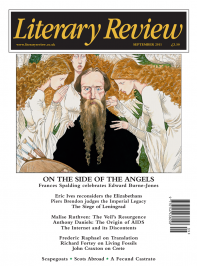Ursula K Le Guin
Towards Darkness
Ragnarök: The End of the Gods
By A S Byatt
Canongate 240pp £14.99
Retelling a great myth is like performing a famous piece of music: between faithfulness to the familiar score and personal interpretation of it lie many risks and choices. Between the worldview of a Norse skald, or poet, and that of a writer ten or fifteen centuries later, the scope for risks and choices is immense. Ragnarök, A S Byatt’s contribution to the Canongate Myths series, is a brilliant, highly intelligent, fiercely personal rendition of the Scandinavian mythology.
Its personal element has particular resonance for me because, like A S Byatt, I was a child during the Second World War. I, too, read the Norse myths, and like her I found they made sense of the strange world we were growing up in. But California was

Sign Up to our newsletter
Receive free articles, highlights from the archive, news, details of prizes, and much more.@Lit_Review
Follow Literary Review on Twitter
Twitter Feed
How to ruin a film - a short guide by @TWHodgkinson:
Thomas W Hodgkinson - There Was No Sorcerer
Thomas W Hodgkinson: There Was No Sorcerer - Box Office Poison: Hollywood’s Story in a Century of Flops by Tim Robey
literaryreview.co.uk
How to ruin a film - a short guide by @TWHodgkinson:
Thomas W Hodgkinson - There Was No Sorcerer
Thomas W Hodgkinson: There Was No Sorcerer - Box Office Poison: Hollywood’s Story in a Century of Flops by Tim Robey
literaryreview.co.uk
Give the gift that lasts all year with a subscription to Literary Review. Save up to 35% on the cover price when you visit us at https://literaryreview.co.uk/subscribe and enter the code 'XMAS24'